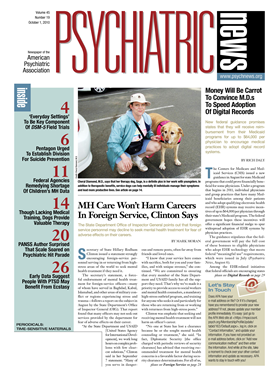It was nearly three years ago this summer that the second stage of DSM-5 development was publically launched with the naming of the members of the DSM-5 Task Force. Prior to that, initial preparations for the manual had focused on a series of international research-planning conferences to assess the state of the science and determine what clinical needs DSM-5 may help address.
In the short time since that important task force announcement, development of
DSM-5 has steadily progressed. Both the
DSM-5 Task Force and the 13 work groups—which together include more than 160 individuals—continue to discuss potential changes. More recently, the first draft of proposed diagnostic criteria and changes to
DSM were made public on the newly created <
www.dsm5.org> Web site. This opportunity for visitors to the site to submit feedback and comments about draft changes was historic and represented a significant milestone in the evolution of
DSM.As we grow closer to the 2013 publication deadline, the next essential phase of the development process is upon us: the implementation of the DSM-5 field trials. These brief clinical studies are designed to help determine whether the work groups' proposed changes are useful to clinicians, are helpful for patients, and lead to accurate diagnoses. Field trials are also needed to examine changes that are considered significant or that may potentially impact a large number of individuals.
One highly important aspect of field testing is examination of how DSM-5 will perform in real-life settings. As a result, we have designed a simple type of field trial to be conducted among nearly 4,000 clinicians from private or smaller practices. Participants will include a random sample of 1,400 psychiatrists drawn from a physician database maintained by the AMA. This strategy ensures that these psychiatrists have the necessary training to recognize, diagnose, and treat mental illnesses—they are thus clinical experts whose input on DSM is greatly needed. Among this random selection of psychiatrists will be individuals with specialization in treating child, geriatric, and substance use populations. In addition, APA will ask 2,500 other clinicians to volunteer their time as participants. This group will consist of 1,500 psychiatrists, 500 psychologists, 500 social workers, and 500 psychiatric nurse practitioners.
These “everyday setting” field trials were designed to be straightforward and impose very little burden on the clinicians who take part. Each clinician will use the proposed DSM-5 diagnostic criteria to assess one new patient and one patient who already receives services at the practitioner's office. Both clinicians and patients will also use new questionnaires designed to facilitate the detection of multiple diagnoses and/or underlying symptoms that negatively impact the patient and require treatment. Clinicians and patients will be asked to rate how user-friendly these measures are, and clinicians will rate their usefulness in terms of making diagnoses, formulating treatment plans, and tracking responses to treatment. Each patient will undergo a clinical interview during one appointment and will again take part in an interview at a follow-up appointment four to 12 weeks later. Ideally, this follow-up session will take place during a regularly scheduled appointment. Approximately 30 to 40 diagnoses will be covered by this trial.
This basic approach to field testing is unique to
DSM's history. Although field trials are certainly not new, gathering data from clinicians in routine practice—who make up a large portion of
DSM users and provide valuable information for how
DSM-5 may perform in routine care—is a novel strategy that will help set
DSM-5 apart from its predecessors. Results from this field trial will be more generalizable to the real-world, day-to-day uses of
DSM. This approach will strengthen our ability to determine how proposed changes will truly impact patients and the care they receive. However, field testing for
DSM-5 will encompass more than just sampling from routine clinical settings. A second, more complex strategy for field testing has been designed specifically for gathering data from large, academic medical settings. In my next column, I will discuss the details of these field trials and how they—in combination with the smaller, “everyday setting” field trials—will help bridge the gap between science and practice.

